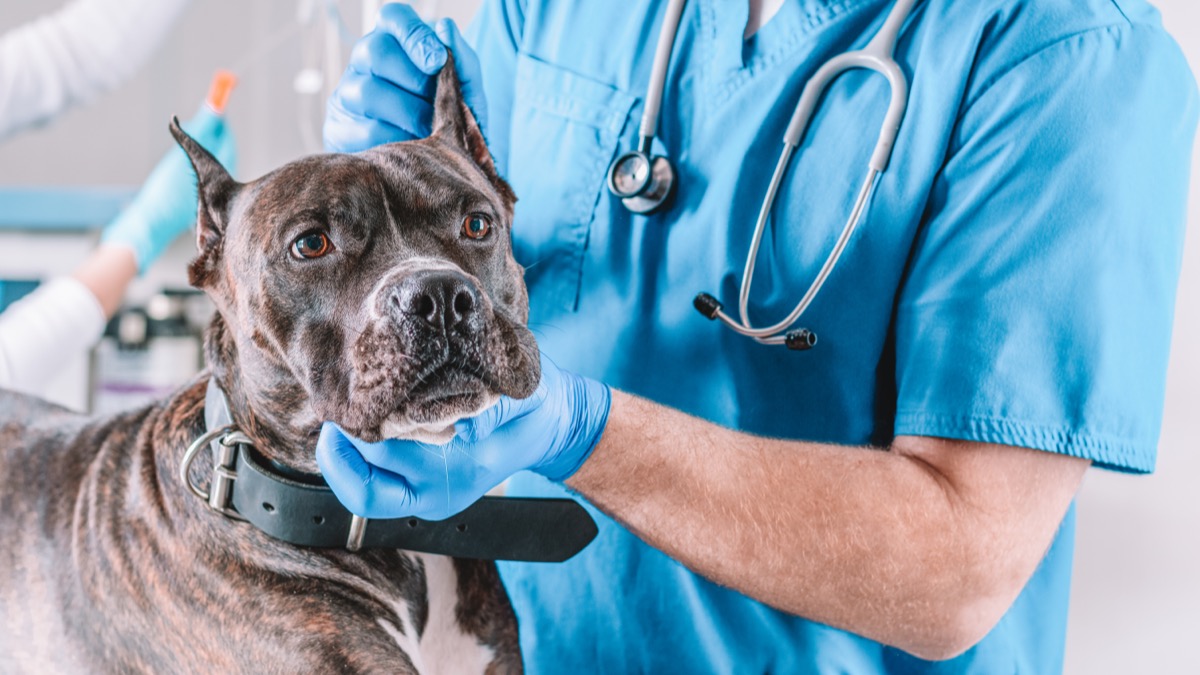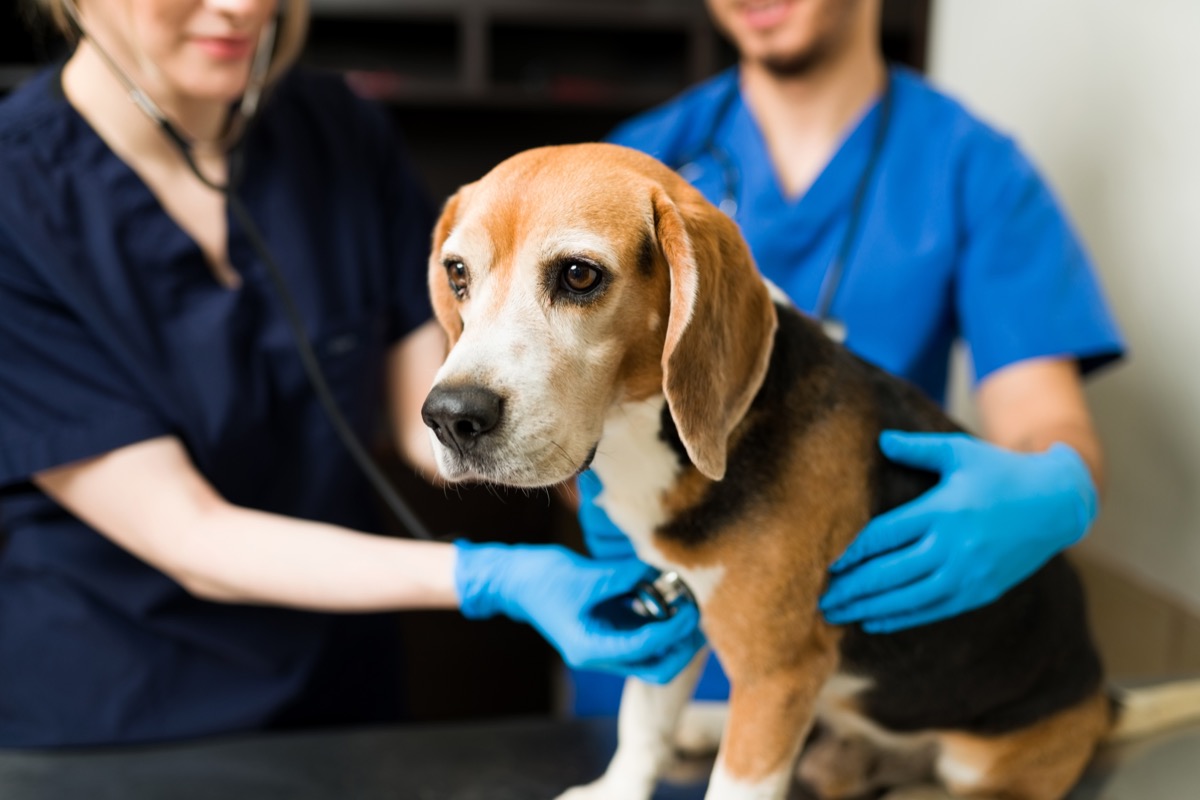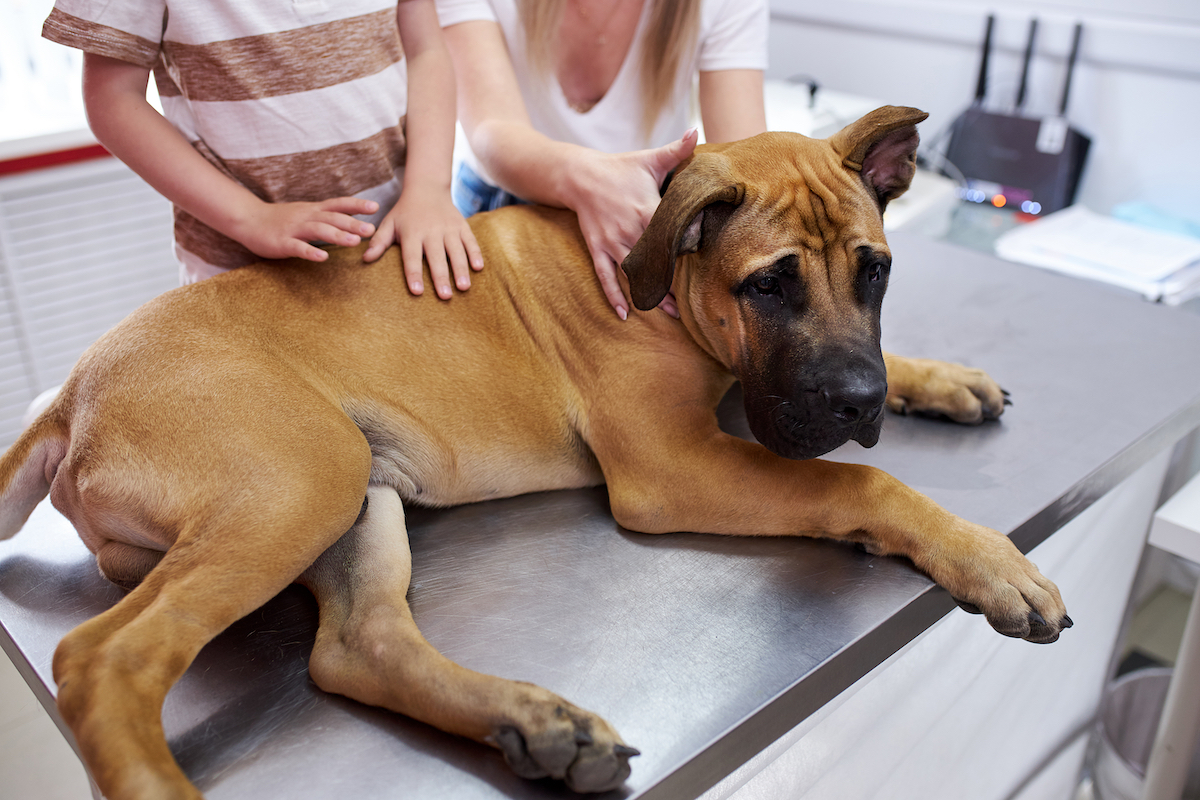The 5 Biggest Mistakes Dog Owners Make at the Vet
There are a few things vets wish you'd stop doing.
We all want to be the best dog owners possible. We take our pups on interesting walks, give them lots of snuggles, and throw their toys back and forth until they get tired. But there's a facet of dog care that's a lot less fun—and sometimes downright scary: going to the vet. Of course, your vet has your dog's best interest in mind. However, getting Fido into the exam room can cause anxiety for many. Still, it's absolutely necessary, and you'll want to come prepared to ensure you get the most out of each visit. That's why we spoke to vets and vet techs to get the inside scoop on the most common mistakes dog owners make at the vet—and how to avoid them. Read on to ensure your next vet visit is problem-free.
READ THIS NEXT: 5 Secrets Dog Groomers Won't Tell You.
1
You don't give your vet the full picture.

For your vet to give your dog the best care, you need to give them as much information as possible. "Owners often underplay how poorly their dog is or leave out certain symptoms for fear that they will look bad for not seeking care sooner," says Linda Simon, DVM, a veterinary surgeon and a consultant for FiveBarks. "Similarly, some owners are so worried that the vet will suggest their pet is put to sleep, they pretend their dog is coping better than they are."
Unfortunately, this will do your pup a disservice. "We can only work off what we are told and the more accurate the information we have, the better we can help," says Simon. "Owners must understand that euthanasia is only advised when it is in the best interest of a pet, and typically, the owner and vet will both come to the same decision, once it is time." Until then, you'll want to bring a detailed note with all of your pet's symptoms or unusual behaviors. That way, your vet will be able to easily diagnose and treat your pal.
2
You tell white lies.

You (hopefully) wouldn't lie to your doctor, so why would you lie to your vet? "Owners may tell 'white lies' when it comes to things they think reflect badly on them," says Simon. "For example, they may claim to only be feeding a couple of treats a day, when really they are giving far more. They worry they will be told off by the vet."
But your vet isn't there to judge—only to get your dog back in tip-top shape. "If we see a dog who is not losing weight despite being fed the correct amount, we start to worry about medical conditions like hypothyroidism," Simon explains. "However, if the real issue is that the owner is sharing their morning banana bread, then we can save the dog from having to go through an unnecessary blood test!" See, honesty is always the best policy.
READ THIS NEXT: A Vet Just Revealed the 5 Dog Breeds He Would Never Own.
3
You wait too long to visit the vet.

There's one non-negotiable when it comes to pet ownership: you need to bring your pet to the vet once a year and when they're sick. "Animals cannot speak and are genetically wired to hide illness and pain," says Jamie Whittenburg, DVM, lead veterinarian at Senior Tail Waggers. "Often, by the time the owner brings the pet to be seen by me, the issue is more serious and much harder to treat." This can lead to unnecessary suffering on the pet's part and a pricier treatment plan for the owner.
Skipping your annual vet visit is also a big no-no. "These exams, when a dog is healthy, allow for owners to make a relationship with their veterinarian, have the doctor be able to get to know the pet, and are essential in catching illnesses early," says Whittenburg. Schedule one now to ensure your pup lives its longest and happiest life.
4
You try to physically hold your pet.

Once you arrive at the vet, you'll want to let your doctor and their staff do their jobs—and stay out of their way unless they ask for your help. "As much as vets wish it wasn't so, the clinic can be an extremely terrifying place for a dog, to the point where they might do things which they absolutely would not do outside of the clinic—including biting," says Patrik Holmboe, head veterinarian for Cooper Pet Care. "Vets and techs are trained to hold animals, and having a dog bite their owner is the worst possible outcome."
The one time you should be hands-on at the vet is in the waiting room. In particular, Holmboe wishes all dog owners would prevent their dogs from sniffing cat cages. "Most cats are very scared at the vet clinic and having a big, scary dog come right up to them in this situation is even more terrifying—no matter how friendly your dog may be," Holmboe says. "Even with other dogs—always ask their owner first if it's ok to sniff." Again, dogs may behave differently at the vet than they would in other spaces.
For more pet advice delivered straight to your inbox, sign up for our daily newsletter.
5
You don't ask questions.

Your trip to the vet should be as information-packed as possible, especially if your dog is undergoing a new treatment. "Dog owners should come to the vet prepared to ask questions regarding what treatment and diagnostics are recommended or needed, how much time they will take, and how much they will cost," says Denise Loft, vet assistant and customer support agent for Hello Ralphie, a telehealth company for pet parents. "Not asking for an estimate as far as the potential cost can lead to unexpected expenses and sticker shock when it's time to pay the bill. If your dog needs to be left at the vet for diagnostics, not getting a time estimate can lead to frustration and possible changed plans." Ask all your questions and be up-front with your vet about your concerns. They'll be able to work with you to find a plan that fits your budget and availability.






















